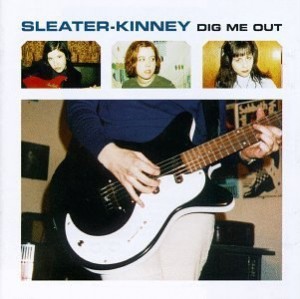
Sidelined and silenced, at least musically, for nearly a half-decade, former Sleater-Kinney comrade Corin Tucker has finally returned, applying newfound Classical maneuvers, richer dramatic emotionality, and a little eccentric percussion to her veritable indie rockist notions on a long-anticipated album that’s sure to please.
But it hasn’t been a truly satisfying sabbatical from music for the iconic ‘riot grrrl’ of yore. Since Olympia, Washington’s most notorious trio amicably departed, she’s been away from her loving husband for long periods of time, making isolation the major topic of interest for the caring mother-of-two.
“I wanted to branch out and do different types of music,” Tucker says while her young children (one born during her former bands’ heyday) fidget in the background. “We did use strings on Hot Rocks (Sleater-Kinney’s artfully deviating ’99 disc). We tried it, but not very much. I’m committed now to different musical styles. But I haven’t toured in four years.”
While Sleater-Kinney’s liberated feministic perspective advanced the strong-willed non-conformist determination empowering less financially and commercially successful riotous foremothers Bikini Kill, Team Dresch and Bratmobile, Tucker’s latest outfit concentrates on inwardly focused themes given curious instrumental abstractions.
Teamed up with veteran Unwound percussionist, Sara Lund, and unjustifiably unheralded Golden Bears bassist, Seth Lorinczi, Corin Tucker Band’s 1,000 Years nobly expands upon the raspy punk-inspired electricity embodying her previous troika.
Although Tucker remains a motherly homebody, her husband, respected movie director Lance Bangs, continues to stay on the road for lengthy periods. This doesn’t please Tucker, especially since the 30-minute HBO-sponsored documentary, The Lazarus Effect (promoting a life-saving antiretroviral medicine), took Bangs to Africa, where the fear of AIDS and criminal activity takes its toll on a spouse anguishing quietly in safer American confines.
With that in mind, many 1,000 Years highlights are full of incessant yearning.
Tucker’s frustration could be heard in her voice as she confides, “Lance interviewed people who needed AIDS treatment, traveling the African continent. You never knew if he’d be ill. I was home with two kids worried. It was sometimes impossible to get a hold of him. So this album was about that time in my life.”
In fact, “Half A World Away” speaks directly about the situation. A proggish number smitten with fleet jungle rhythms and sleigh bells ‘til a more conventional guitar-bass-drum setting unfurls halfway through, it’s full of longing sentiments and frighteningly quivered fervency. Then there’s the separation anxiety imbibing, desolate piano ballad, “Miles Away” (evoking freak-folk starlet Regina Spektor via ‘70s-based laureate Carole King), and eruptive guitar-emblazoned neo-psychedelic treatise, “Big Goodbye.”
Tucker jumps in, “I wrote “Big Goodbye” for the Twilight / New Moon soundtrack. I loved the character and the voice in the book. I took it as a creative writing assignment.”
Another New Moon composition, “1,000 Years,” brings aboard a gothic narrative concerning coming back to life. For Tucker, it felt like a powerful return to form after leaving the music scene for an extended maternity leave. An eloquently commencing title track doused by fuzzy guitar flanging, it’s easy to get into and wholly triumphant.
Make no mistake, Tucker’s latent prog-rock influences (sometimes disseminated from Sleater-Kinney’s final album, ‘05s The Woods) could also be felt firsthand throughout. On contemplative rampage, “Handed Love,” she juggles a few uniquely strewn motifs, as simmering art-rock organ inaugurates the hauntingly bleak Blues-fueled ‘got love if you want it’ banter infiltrating forceful Who-like guitar buzzing to its inevitable burn out.
“That’s very experimental. I tried a bunch of different ideas,” Tucker claims. “Its lyrics involve my friends’ struggling relationships. It’s often so difficult to maintain a connection.”
Musically, her own connection to current band mates, Lund and Lorinczi, couldn’t be any tighter. That’s the reason this newest venture could be positively compared to Tucker’s erstwhile long-time associates.
“Sara’s an amazing talent. She added a lot of bells and percussive elements to the set.”
“Seth’s approach to production was to make each song complete sonically. On the acoustic songs, he worked on my guitars to let it sound complete. And he wrote and arranged the string parts. I think there’s some guitar stuff that’ll take you to another place. But part of what you do in your musical past always fills out your next project. You’re always trying to build on that.”
Inevitably, there are a few instances that graciously recall Sleater-Kinney’s best restive tunes. Fiery love-struck wrangler, “Doubt,” retains the same shrieking yelps, sultry pleading and screaming six-string fury of yesteryear. Utilizing the famous soft-loud catch-and-release approach nearby Seattle grunge bands once touted, this unguarded ‘stress track’ hammers away at the brain before completely dropping out, then re-emerging with a murky organ groove underpinning an oncoming train wreck that brings it all back home.
Less indicative of past forays, one more fast-slow changeup, “It’s Always Summer,” begs for reconciliation as Tucker pines for her distant lover stuck inside a delirious Third World nation. Approximating, acoustical Appalachian folk, Tucker’s desirous lamentation nearly slips into Quarterflash’s compelling ‘80s scorcher “Suddenly Last Summer” until Classical strings darken the mood for an understated heavenly choral swoon.
“That song happened naturally on acoustic guitar. It took on its own personality. Seth’s standup bass was then brought in,” Tucker lets on.
In similar fashion, soft-toned ballad “Dragon” drifts by eerily, contrasting sensitive orchestral poignancy with slowly bashed cymbals and toms. Notwithstanding the abrasive electric guitar, bedraggling elegantly strummed mood-scape, “Pulling Pieces,” its misty flourishes waver through downcast verses numbingly quavering ‘I’m just a shadow of what I used to be.’ These sullen moments of ravaged aloneness make Tucker’s solo plight a slight departure from her ‘riot grrrl’ past. Being a mother of two with a husband can’t be easy and it’s certainly different than being a semi-famous ‘90s rock star.
But she lets it all hang out on manic depressant refutation, “Riley,” where her rhythmic guitar willfully breaks into “So You Want To Be A Rock And Roll Star.”
“I love the Byrds. Patti Smith’s version is an all-time favorite of mine,” Tucker insists. “Seth and I are also both big fans of ‘70s music. And we’ve been playing music 20 years so these songs touch on our relationship with music.”
Not surprisingly then, Tucker’s piano strolls into “Rock And Roll Star” one more time during the tear-dropped timidity of “Thrift Store Clothes.”
Undeniably, Tucker’s exalted indie rock status secures her past and commands her future. But now she’s not afraid to reach further back to earlier torchbearers for fresh inspiration, even though she’s in her mid-thirties now. A few obvious influences, some being very respectable independent women, get mentioned before she has to hang up the phone and attend to the kids.
“I grew up in a household that had music playing all the time. My dad had amazing taste. We listened to the Rolling Stones and Bob Dylan,” she remembers. “When I was 10, I got into Chrissie Hynde (of the Pretenders) and Joan Jett. And I loved Patti Smith. All these women had a toughness and presentation that was all about the music. It’s like, ‘Look out. Here I come.’ They demanded attention in a serious way. It wasn’t about being a starlet.”
Words of wisdom, indeed. Especially when reiterated more than 1,000 days, if not 1,000 Years, after Tucker took time off to raise a family following the resounding decade-long success of a seminal female trio still receiving idol praise and recognition. There’s no rust on this lady.

